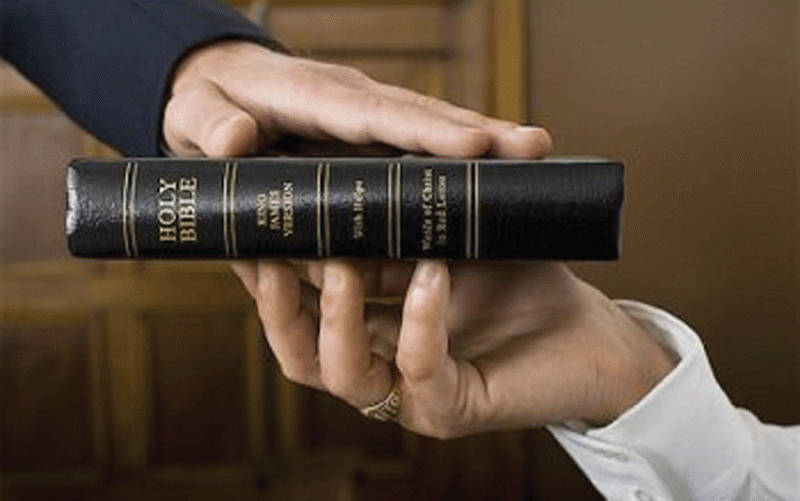
A lot of us are in the habit of swearing by the name of our God, for people to take what we say seriously.
Even for other frivolous or unimportant reasons, there is still this tendency of misusing the Lord’s name.
We sometimes swear in His name to get ourselves out of a guilty situation, in falsehood. There is usually no hesitation to swear by His name left, right and centre as if the name is a plaything. God’s name tops the list of the people in whose name we swear as a means to an oath.
What is his name? In the second book of Moses, commonly called Exodus, in chapter 3 Moses is tasked by the Lord to go to the Pharaoh of Egypt to bring forth the sons of Israel out of slavery into the promised land.
Verse 13-15 then reads: Then Moses said to God, “If I go to the people of Israel and say to them, ‘The God of your fathers has sent me to you,’ and they ask me, ‘What is his name?’ what shall I say to them?” God said to Moses, “I AM WHO I AM.” And the Lord said, “Say this to the people of Israel, “I AM has sent me to you’” God also said to Moses, “Say this to the people of Israel, ‘The Lord, the God of your fathers, the God of Abraham, the God of Isaac, and the God of Jacob, has sent me to you’: this (I AM WHO I AM) is my name forever, and thus I am to be remembered throughout all generations.”
From the Lord our God’s interaction with Moses, it becomes very clear from the conversation that He does not want people to call Him by His name as if He is one of us. He is above humanity. By telling Moses to tell the people that His name is “I AM WHO I AM”, it means we should refer to Him as ‘HE IS WHO HE IS’. It means He simply does not want us to use His name.
It is for this reason that God uplifted the importance of limiting of the use and misuse of each of the names we have given Him, according to our different languages, in reference.
He thus made it the third most important item on His agenda of commandments. His third commandments reads; “You shall not take the name of the Lord your God in vain; for the Lord will not hold him guiltless who takes His name in vain.”
- GRDC in corruption allegations
- Divine insight: Secrets about prophetic timelines
- Grace tidings: Do you understand what it means to be holy?
- Katai fails to make the cut but …
Keep Reading
Honestly speaking, I have yet to come across a gospel preacher preaching about the third commandment.
It is as if it’s the least important of them all. People just tend to read past and through it without giving it much attention, as if it’s irrelevant.
I know there are sects within our Christianity that no longer subscribe to the commandments of God. They quote mostly from the letters written by apostle Paul to support this lawless inclination.
However, they quote St. Paul wrongly as he clearly indicated why at times he spoke as if free from the yoke of the commandments, ‘the law’. For those who claim Apostle Paul said we should no longer be bound by law, may I deviate from this topic of the third commandments and quote exactly how St. Paul explained some of his teachings.
In 1 Corinthians 9:19-23, he clarifies, “For though I am free from all men, I have made myself a slave to all, that I might win the more. To the Jews I became as a Jew, in order to win Jews; to those under the law I became as one under the law, that I might win these outside the law. To the weak I become weak, that I might win the weak. I have become all these things to all men, that I might by all means save some. I do it all for the sake of the gospel, that I may share in its blessings.”
Back to the third commandment, people swear willy-nilly by the name of the Lord to try to emphasise that they are telling the truth.
In Mathew 5:33-37, Jesus Christ spoke; “Again you have heard that it was said to the men of the old, ‘you shall not swear falsely, but perform to the Lord what you have sworn?’ but I say to you, do not swear at all either by heaven, for it is the throne of God, or by the earth, for it is his footstool, or by Jerusalem, for it is the city of the great King. And do not swear by your head, for you cannot make one hair white or black. Let what you say be simply ‘Yes’ or ‘No’. Anything more than that comes from evil.”
Jesus Christ couldn’t have put it any better, being the greatness teacher of wisdom.
He teaches us to simply stop swearing, especially by using as reference the Lord our God. Anything said or sworn requires just a ‘Yes’ or ‘No’ answer.
Trying to justify our self using God’s name or by our father’s or mother’s names as a substitute should not be the scapegoat for swearing.
Sometimes we promise either to perform or undertake particular obligations for one reason or other, and proclaim a vow in the name of the Lord to assure others that we would fulfil the promise.
In Deuteronomy 23:21-23, God spoke; “When you make a vow to the Lord your God, you shall not be slack to pay it. For the Lord your God will surely require it of you, and it would be sin in you. But if you refrain from vowing, it shall be no sin in you. You shall perform what has passed from lips, for you have voluntarily vowed to the Lord your God what you have promised with your mouth”.
It is also common practice in some national justice and judicial systems to force plaintiffs or defendants and witnesses to swear by the Holy Bible prior to giving any evidence before the magistrates or the judges.
The Bible represents the works and spoken words of the Lord our God, of His Son Jesus Christ and of the prophets and apostles of the gospel therein. What have they all to do with the matters at hand?
We should simply ask for the required answers as prescribed by Jesus Christ, i.e. “Yes” or “No” as the methodology of seeking the truth. Justice will be served.
*Prosper Tingini is the Scribe of the Children of God Missionary Assembly — God’s messengers. Contact details: Mobile & Whatsapp – 0771 260 195. Email address: [email protected]










